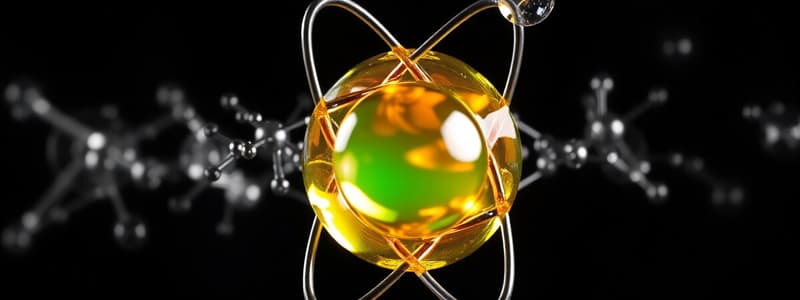Podcast
Questions and Answers
Which of the following best describes the role of water in hydrolysis reactions?
Which of the following best describes the role of water in hydrolysis reactions?
- Water is removed to facilitate the formation of larger molecules.
- Water facilitates the transfer of electrons between molecules.
- Water molecules combine to form larger molecules, releasing energy.
- Water is used to break down large molecules into smaller ones, releasing energy. (correct)
In a redox reaction, a substance is oxidized. What simultaneously happens to another substance in the same reaction?
In a redox reaction, a substance is oxidized. What simultaneously happens to another substance in the same reaction?
- It loses protons.
- It is reduced. (correct)
- It remains unchanged.
- It also gets oxidized.
If an atom loses an electron, what type of ion does it become, and what is its charge?
If an atom loses an electron, what type of ion does it become, and what is its charge?
- Anion, negative
- Cation, negative
- Cation, positive (correct)
- Anion, positive
A solution is tested and found to have free ions present in a solvent. Based on this information, the solution can be classified as which of the following?
A solution is tested and found to have free ions present in a solvent. Based on this information, the solution can be classified as which of the following?
Which of the following is a key distinction between organic and inorganic compounds?
Which of the following is a key distinction between organic and inorganic compounds?
Flashcards
Matter
Matter
Anything that occupies space and has mass; exists as solid, liquid, or gas.
Atom
Atom
The smallest particle of an element that retains the characteristics of that element.
Ion
Ion
Electrically charged atom or molecule due to the loss (cation, positive) or gain (anion, negative) of electrons.
Dehydration Synthesis
Dehydration Synthesis
Signup and view all the flashcards
Salt
Salt
Signup and view all the flashcards
Study Notes
- Matter: Occupies space and has mass.
- Exists as solid, liquid, or gas.
- Composed of elements.
- Chemical Compound: Combination of elements.
- Atoms: Smallest particles of an element
Atomic Structure
- Atomic Nucleus: Contains protons and neutrons.
- Protons: Positively charged particles.
- Neutrons: Particles without charge.
- Electrons: Negatively charged particles.
- Ions: Electrically charged atoms, molecules, or particles.
- Cations (+): Result from electron loss.
- Anions (-): Result from electron gain.
- Electrolyte: Free ions in a solvent.
Chemical Reactions
- Synthesis (Dehydration Synthesis): Formation of larger molecules from smaller ones, accompanied by the removal of H2O; endergonic (requires energy).
- Hydrolysis: Breakdown of large molecules, requires H2O; exergonic (gives off energy).
- Redox (Reduction-Oxidation): Simultaneous electron transfer reactions.
- Reduction: Gain of electrons.
- Oxidation: Loss of electrons.
Compounds
- Hydrophilic: Water-soluble (water-loving).
- Hydrophobic: Insoluble in water (water-repelling).
- Inorganic: Primarily does not contain carbon (except CO & CO2); includes acids, bases, salts, and water.
- Acids, bases, and salts dissolve in water without releasing hydrogen or hydroxyl ions.
- Organic: Contains carbon and hydrogen.
- Inorganic: Primarily does not contain carbon (except CO & CO2); includes acids, bases, salts, and water.
Studying That Suits You
Use AI to generate personalized quizzes and flashcards to suit your learning preferences.




